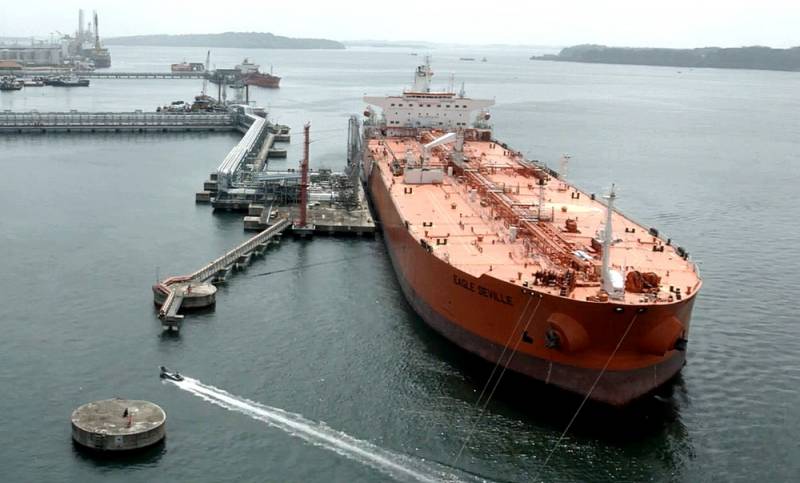Russia is preparing a response to the American "shale revolution"
"Decarbonization" by "decarbonization", but the need for hydrocarbon raw materials has not yet been canceled. Three leading economic the player - the United States, the European Union and the PRC - can afford a program to abandon the use of oil and gas over the next 30-40 years, but the "simpler" countries, of which the majority, will depend on fossil fuels for another 100 years at least. The interest of international investors in the Russian Arctic project "Vostok Oil" only confirms this.
Vostok Oil is a mega-project from the state-owned Rosneft, which immediately made it a favorite in the eyes of strategic investors and traders. According to preliminary estimates by Goldman Sachs, over $ 2020 billion could come to the Russian Arctic between 2060 and 100, despite the Western sanctions regime! What explains this contradiction?
Green oil
Two years ago, the head of Rosfneti, Igor Sechin, proposed to unite all Arctic fields within the framework of one project. The resources of the Vankor cluster, the Payakhskoye field and the West Irkinsky area, as well as the fields of the East Taimyr cluster, the total potential of which is estimated at 5-6,2 billion tons of oil, were collected in one fist. For its export, a port will be built on the Taimyr Peninsula, and delivery will go along the Northern Sea Route. This is all very good, of course, but what exactly makes Arctic oil so desirable?
At first, in the slang of specialists, Russian oil belongs to the category of "sweet", since it is initially favorably distinguished by its low sulfur content. This will make it possible to do without special installations at the refinery during its subsequent processing.
Secondly, the already low "carbon footprint" can be reduced even more, explains the head of the state-owned company Igor Sechin:
The design solutions provide for the complete utilization of associated petroleum gas, which will provide the project with a carbon footprint that is 75% lower than that of other major new oil projects in the world.
Petroleum gas will be burned on site to generate electricity for the Arctic cluster. Thus, we can speak of the unusually high environmental efficiency of the Russian project, and the oil can be classified as “green”.
Thirdly, even more profitable from the point of view of the economy "Vostok Oil" makes it possible to export raw materials by the Northern Sea Route. Geographically, production will be carried out approximately in the middle of the NSR at an equal distance from potential consumers in Asia and Europe. This waterway can deliver "green oil" to customers faster than the traditional Suez Canal.
It is not surprising that the Russian project has attracted increased attention from foreign investors. But who are they?
"Arctic multi-vector"
One of the main phobias of the modern Russian Federation is the fear that the mighty China, to which we defiantly turned in 2014, will gently strangle us in its “friendly” embrace, gradually taking over the Far East, Siberia, and now the Arctic. Indeed, Beijing is showing increased interest in Arctic resources and the Northern Sea Route as an integral part of its New Silk Road. And here we must pay tribute to the sanity of the Rosneft management, which did not immediately spread the red carpet to Vostok Oil in front of its Chinese partners. On the contrary, it was defiantly bet on India as the main competitor of the PRC in the Asia-Pacific region.
The increased external activity of Beijing worries all, without exception, the neighbors of the Celestial Empire, including India. On the one hand, New Delhi is interested in limiting China's expansion into the Russian Arctic, on the other hand, the Indians themselves need natural resources. While the United States, the European Union and the PRC are playing "decarbonization", the International Energy Agency (IEA) review says the following:
With industrialization and urban growth over the next 20 years, India's energy demand will grow at the fastest pace of any other country in the world.
The Indian economy needs oil and gas, high-grade coal to smelt steel, copper, platinoids, phosphorus and niobium, and Arctic bioresources to feed its gigantic population. All this can be provided by Russia, and Beijing is a direct competitor to New Delhi. Knowing this, Rosneft initially offered the Indians 49% of Vostok Oil at all, but under pressure from the United States, the country's leadership was initially forced to refuse such a large-scale participation in the Russian project. Nevertheless, a 49% stake in the Vankor field has long been owned by the Indian consortium ONGC, Oil India, Indian Oil Corporation and Bharat PetroResources. Last year it became known that the Russian state-owned company offered the Indian side an exchange of their stake in Vankor for a minority stake in the entire Vostok Oil. Apparently, New Delhi is inclined to this and is likely to increase the volume of participation in this promising Arctic project.
The actions of other foreign investors indicate that it is not worth scratching your head for too long. Last year, a 10% stake in Vostok Oil was acquired by the Swiss-based transnational commodity trader Trafigura. He was not afraid to invest 1,5 billion euros of his own funds, and took the rest of the total investment of 7 billion on credit. The Swiss trader intends to pay off the interest on the loan from dividends. And this despite the anti-Russian sanctions regime! In addition, this summer another 5% of Vostok Oil was acquired by a consortium of traders from the Dutch company Vitol SA and Singapore's Mercantile & Maritime Energy for 3,5 billion euros. Even if Chinese investors come, there is no need to talk about their dominance and dictation of conditions from Beijing.
Thus, the Arctic region is turning into an ambitious international project right before our eyes, which should become one of the powerful drivers for the development of the Russian economy.

Information